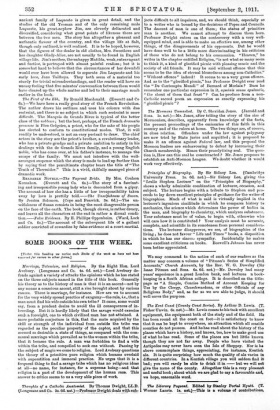jects difficult to all inquirers, and, we should think, especially
so to a writer who is bound by the decisions of Popes and Councils. The descent of man is one of them ; the status of primitive man is another. We cannot attempt to discuss them here. Professor Dwight enters on the controversy with a very well- equipped mind, and is able to make an effective use, among other things, of the disagreements of his opponents. But he would have done well to be a little more discriminating in his criticism of those who do not belong to his communion. "Heaven," he writes in the chapter entitled Religion, "is not what so many seem to think it, a kind of glorified picnic with pleasing music and the society of old friends. It may be said without offence that this seems to be the idea of eternal blessedness among non-Catholics." "Without offence" indeed ! It seems to us a very gross offence. And as to the "glorified picnic," has Professor Dwight ever read the " De Contemptu Mandl " of Bernard of Morlaix ? Does he remember one particular expression in it, agminis sonus epu/antis, "the shout of them that feast " ? Can he produce from a non- Catholic sacred poem an expression so exactly expressing his " glorified picnic " ?






































 Previous page
Previous page